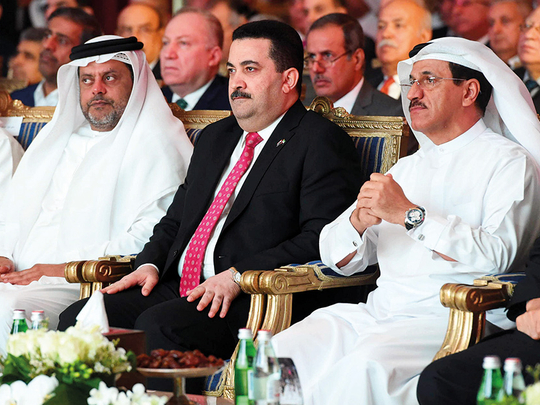
Abu Dhabi: The UAE’s non-oil contribution to its GDP (gross domestic product) will jump by about 14 per cent in four years due to rapid diversification of the economy, Sultan Bin Saeed Al Mansouri, Minister of Economy, said on Monday.
Currently, the non-oil sector contributes 70 per cent of the UAE’s GDP with oil contributing the remaining. By 2021, the non-oil sector will contribute 80 per cent, he said.
“Efforts are being made to increase the percentage of non-oil sector to the GDP by 80 per cent by 2021 in order to establish the base for post-oil economy,” said Al Mansouri while speaking at the UAE-Iraq Trade and Investment Forum in Abu Dhabi.
He also said Foreign Direct Investment (FDI) jumped by 10 per cent in 2016 with $9 billion (Dh33 billion) coming in multiple sectors with the UAE ranked 13th globally in terms of attracting FDI. “We expect more investment growth in the coming years in infrastructure expansion, industries and Expo 2020,” he added
The UAE has been investing billions of dollars in transportation, industry and tourism to boost the economy’s non-oil sector. The move is likely to compensate for the lower growth due to lower oil prices.
Speaking on Iraq-UAE trade ties, Al Mansouri said the volume of non-oil trade between the two countries reached a relatively high rate at $11 billion.
“Considering the complicated geo-political challenges and high rate of economic variable in the region over the past few years, we view this rate as a positive indicator that expresses the awareness of both countries to build strong and sustainable partnership.”
As the UAE and Iraq are both oil exporting countries, the volatility in oil prices are a threat to oil exporters, he said, adding that both countries need to enhance their partnerships in economic and investment fields for sustainable development.
“We look forward to discover the opportunities Iraqi markets offer, which are starting to recover and regain developmental aspects.”
Al Mansouri further pointed out that there are huge opportunities before the private sector in the UAE and Iraq to enhance cooperation and contribute in developing inter-trade and investment.
“Through such partnerships we aim at increasing the presence of Emirati products in Iraqi markets and Iraqi products can benefit from the open trade environment of the UAE and enter the local market or even benefit from its position as the third biggest re-export hub in the world.”
Mohammad Shi’a Al Sudani, Iraqi minister of industry and minerals, called on Emirati business people, investors and companies to increase their investments and presence in Iraq.
“Iraqi government is trying to improve investment climate in the country through new legislations and protection of investments,” he said.












